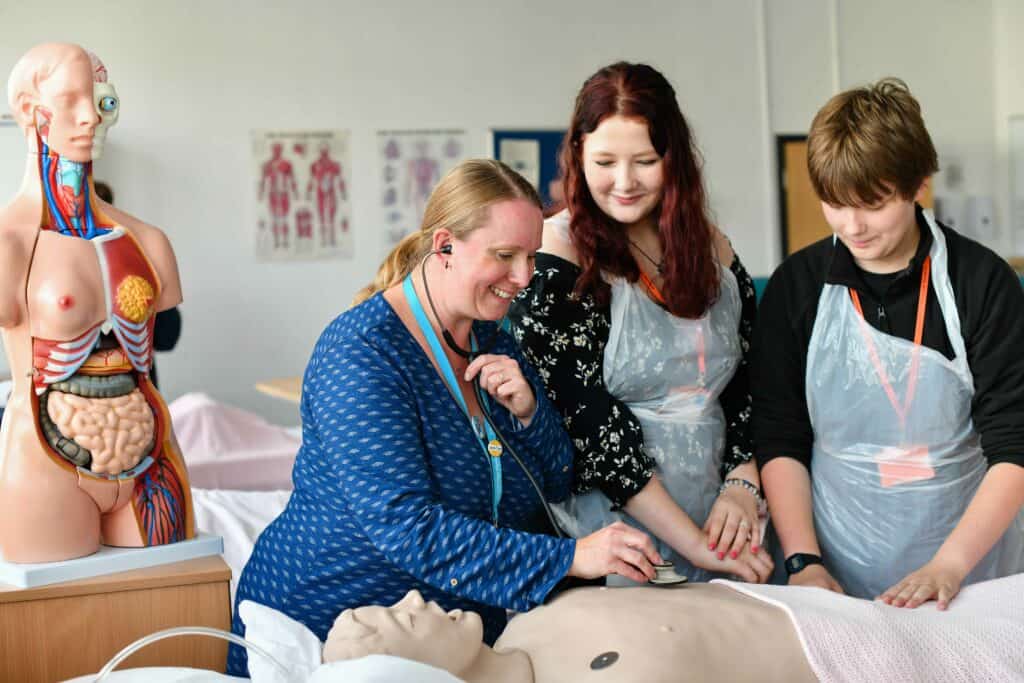The government views health and skills as interconnected, aiming to improve both through initiatives such as the “Get Britain Working” White Paper, the NHS Long Term Plan, and the establishment of Skills England, focusing on economic inactivity, workforce development, and addressing skills gaps.

HEALTH AND ACTIVE WELLBEING
Priorities
In 2025, the government’s health sector priorities have a focus on:
-
improving patient access to timely care including expanding community care
-
increasing productivity and efficiency through improvement of workforce planning by investing in workforce training and addressing staff retention issues
-
driving reforms within the NHS with a focus on digital health.
These priorities are essential nationally, regionally and locally where the city has the largest specialist teaching hospital in the South West peninsula and the region’s major trauma centre employing over 11,000 staff and volunteers, alongside an additional 9,000 roles/staff within the associated social care sector.

Workforce challenges and future skills demand in Health and Social Care
Against this backdrop, the health and social care sector has a high turnover of staff due to work-life balance challenges, and increased workload, as well as concerns about career progression.
The health and wellbeing of the population are further impacting the sector with those furthest from the employment market struggling with poor health and an over reliance on the already overburdened health and social care services, whilst also directly impacting their levels of income and quality of life.
As part of the Skills England: Driving growth and widening opportunities (September 2024) priorities, the health and social care sector has been identified as having the highest volume of roles in demand. Furthermore, forecasts indicate that many of the skills needed in the labour market in 2035 will be impacted by demographic and technological shifts, including this sector.
Increasing female participation and evolving skills in Health and Social Care
In addition, following recent labour market trends of increasing female participation and historical shares of women working in growing sectors, most (60%) of the newly created jobs in 2035 are projected to be taken by women.
This follows growth in sectors such as health and social care, in line with the ageing population, where historically more women have been employed. To meet the growing demand for labour in this expanding sector, historically some male- dominated roles may need to increase female participation thereby also realising aspirations.
Locally, the University Hospital Plymouth NHS Trust has identified that the jobs currently on offer will be dramatically different due to the drive to move from major hospitals to community care; again a different skills set will be required.
Action: Developing Skills for the Workforce of the Future
Skills England identified that the health and social care sector are currently seeing high demand for employees, alongside the need to improve the NHS and break down the barriers to opportunity for young people.
To address this demand, the College provides, and will continue to develop, a suite of qualifications that allow students to take their first career steps in the sector or continue into higher education to seek
those higher level roles.
- Continue providing T Level Health and Science qualifications whilst in 2025/26 securing the NHS and Livewell Southwest as the placement provider with a view to providing employment or support for the students into a Higher Apprenticeship, to provide a workforce to take on the higher clinical roles.
- Develop a “new to care” Pre-Apprenticeship in 2025/26 for those who seek “new into care” roles.
- In 2025/26, include digital skills within the health qualifications to address the move into digital health.
- As the new health and social care qualifications are released in 2025, review and expand course provision to meet the needs of the sector.
During 2025, develop Phase 2 of the NHS & Livewell Southwest Careers Hub to widen the outreach and provide direct support/ access to over 350 job roles, for those within the College, city schools and the community.

Action: Tackling Health and Wellbeing Through Strategic Partnerships
To increase individuals’ opportunities, reduce inequalities, improve individuals’ health and wellbeing and enhance social cohesion, development of strategic partnerships are essential; this allows for effective use of government funding within skills and qualifications.
To tackle health and wellbeing in 2025/26, we shall:
- develop bespoke training in complex needs through funding via Skills Bootcamps in 2025/26
- upskill our partners’ workforce to work alongside those finding their health challenging and being furthest from the employment market
- work alongside our partners to provide relevant work experience leading to employment for those furthest from the employment market
- work alongside strategic partners to develop their offering to provide both health and long term economic impact on the local population.
Action: Accessing Government Funding to Skill and Upskill
As part of funding streams available in the academic year 2025/26 (such as Shared Prosperity Funding and Skills Bootcamp funding), we will develop essential skills that indirectly impact those who struggle with their health and wellbeing (and have a direct impact on the health services, the economy and personal lives).
Get in touch
Kings Road, Devonport, Plymouth, PL1 5QG
Give us a call on: 01752 305300
E-mail us at: info@cityplym.ac.uk